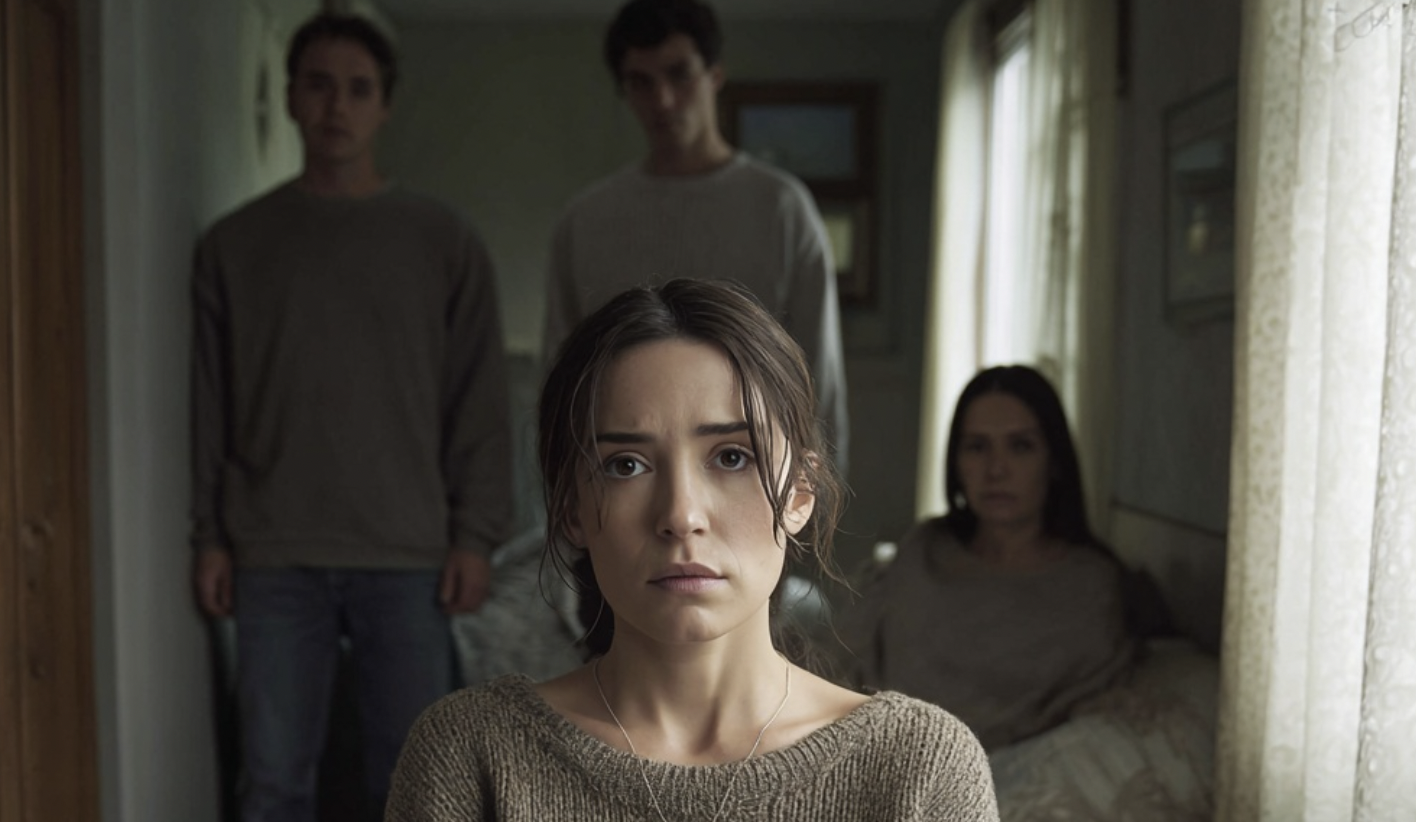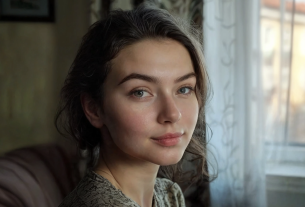Outside the village store, smelling of fresh bread and dust, tempers, as always, were running high. The local gossips, gathered on the worn steps, were picking apart their neighbors’ lives. Today’s main topic was Viktor—the strapping fellow, the village’s prize catch—who had left his wife, Anna.
— “Hear this? Vitka’s run off to the city with a young one!” Claudia confided, lowering her voice and glancing around. “Left poor Anya behind, a cripple. They say that Lyuba of his is practically a girl, has him dancing to her tune.”
— “Shameless,” her neighbor chimed in. “And she wound up bedridden because of him. If not for that drunk, she’d be running around like before.”
Everyone nodded sympathetically. The village knew the tragedy down to the last detail. Three years earlier, in a bitter frost, a drunken Viktor decided to cut across the river and went through the ice. Anna, without a second’s thought, jumped in after him. She—slight and fragile—managed to shove the lump of her feckless husband up onto a solid floe, but she herself couldn’t get out.
A treacherous slab of ice came down over her, pinning her and breaking her spine. Since then, her world had shrunk to the four walls of her home. Anna could only move around the room with great difficulty, every motion answered by such agony that she spent most of her time in bed, staring at the ceiling.
She often replayed their last conversation. Viktor stood in the doorway with a bag packed, unable to raise his eyes.
— “Try to understand, Anya, I’m a young man,” he finally ground out. “I need a normal life, a healthy woman. And this—what is this? A prison, not a life.”
She kept silent, swallowing the tears that rose in her throat.
— “You should… get yourself into a home for the disabled,” he threw out cynically. “They’ll look after you there.”
He tossed a few crumpled bills onto the nightstand and walked out without looking back. The door slammed, cutting her off from her past, from hope, from everything she’d lived for.
Anna lay in bed, staring blankly at one spot. Her face was swollen from crying, and her body ached not only from the old injury but from all-consuming despair. Her husband’s words about the home for the disabled pulsed in her head, burning away the last remnants of hope. Maybe he was right. Who would want her like this? A burden to everyone. The thought of a state institution, where the abandoned and unwanted lived out their days, no longer seemed so terrifying. It felt like the only logical way out of a dead end.
A sudden knock at the door made her flinch. Who could it be? The neighbors seldom dropped by, careful not to burden her with their presence. The knock came again, more insistent. Mustering her strength, Anna slid off the bed, braced herself against the walls, and hobbled to the door.
A man of indeterminate sort stood on the threshold—either a tramp or simply a down-and-out. Old, worn clothes, hair in disarray, a tired, hunted look.
— “Good day, mistress,” he rasped. “Let me stay a couple of nights? I just need to look around your village, find some work.”
Anna froze, peering into his face. Something in his eyes—some hidden pain—made her heart quiver. Anyone else would have shut the door in a vagrant’s face, but she, without quite knowing why, stepped aside and let him in.
— “Come in. There’s a spare bed in that room,” she said softly.
As soon as he disappeared into the room, she cursed herself in her thoughts. She’d gone mad. Letting the first stray that came along into the house! What if he was a thief? Or worse? Yet something kept her from throwing him out.
By evening, the house filled with the smell of fried potatoes. The stranger came into her room carrying two plates. Without a word, he helped her sit up in bed, tucking pillows behind her back. Then he set a wide board across her knees like a makeshift tray and placed the plate before her. Anna looked at him, speechless. In all her married years she hadn’t seen a hundredth part of such simple, quiet care from Viktor.
They ate in silence. The stranger ate quickly, with the hunger of a man who hadn’t had enough for a long time, while Anna picked at her potatoes, the tightness in her throat making it hard to swallow.
— “Dmitry,” he said suddenly, wiping his mouth with his hand. “My name’s Dima.”
He told his story. Five years earlier he’d been released from prison. He’d gotten into a fight while defending his wife from drunken harassment and hadn’t realized his strength. One of the attackers died in the hospital. His wife had promised to wait, wrote letters, but when he came back, it turned out she’d long been living with another man and had already had a child. He drifted around the city, scraping by on odd jobs, and then decided to go out to the countryside to start fresh.
Anna listened, and sympathy stirred in her soul. Two broken lives, two betrayals.
— “Our chairman, Sergei Pavlovich, he’s a good, fair man,” she advised when he finished. “Go to him in the morning, tell it straight. Maybe he’ll help you with work.”
— “And what happened to you?” Dmitry asked quietly, nodding toward her legs.
And she told him. About the drunken husband, the icy river, the pain that had become her constant companion, and Viktor’s departure the day before. She spoke for a long time, for the first time in years letting it all out to the end, and with every word she felt a little lighter.
Meanwhile, the village buzzed like a stirred-up hive. The news that Anna had taken in some outsider had swept through every yard. And when someone found out the stranger was an ex-convict, the rumors took on a sinister shade.
— “She took a murderer into her house!” Claudia gasped outside the store. “He’ll finish her off and burn the place down!”
— “She’s gone mad from grief, looks like,” another chimed in. “Poor woman—but if something happens, it’ll be on her.”
Opinions differed—some pitied Anna, some condemned her—but everyone agreed on one thing: this would not end well.
Two weeks passed. As Anna had advised, Dmitry went to see the chairman. Sergei Pavlovich listened to his honest account, was moved, and took him on at his sawmill. Now every evening Dmitry came back to Anna’s little house. He brought groceries, cooked a simple supper, then sat by her bed and told her about his day, about the men at work, spinning yarns. At first, Anna only listened; then she began to smile a little; and one day she even burst out laughing at one of his jokes. The sound of her own laughter seemed strange and unfamiliar. She’d forgotten the last time she’d laughed.
Dmitry froze, looking at her.
— “You’re beautiful when you smile,” he said simply.
Anna blushed and looked away.
— “Tell me, what do the doctors say?” he asked suddenly, serious. “Is there a chance you’ll walk?”
— “I barely remember what they said,” she answered with a bitter little smile. “I practically ran away from the hospital back then. I was in such a hurry to get home, to the housework, to my husband… Thought he needed me.”
Dmitry’s face darkened. He said nothing, but something new and firm appeared in his eyes.
Three days later he came back from work earlier than usual, together with Sergei Pavlovich in his old Niva.
— “Get ready, Anya. We’re going to the hospital,” he said in a tone that brooked no argument.
Gently, as if she were the greatest treasure, he lifted her in his arms and carried her out of the house. A small crowd of the curious had already gathered at the gate. The villagers watched in silence as Dmitry settled Anna into the back seat of the car. Suddenly Nadezhda, Viktor’s cousin—who had been the loudest to shout that Anna had “shacked up with a con”—stepped forward.
— “Anya, you hang in there!” she called out. “And you, Dmitry, good for you! Don’t listen to us, you foo— I was wrong.”
The car pulled away, leaving behind a surprised and subdued village.
The doctor, an elderly, gray-haired professor, spent a long time studying the old images and then looked at Anna sternly over his glasses.
— “My dear girl, what have you done to yourself?” he scolded gently. “You should have been running ages ago! You abandoned rehabilitation, let it all go. Everything’s ‘stiffened up’ now, mended wrong.”
Anna listened, and tears of despair rose again in her throat.
— “Is there a chance?” Dmitry asked hoarsely, standing beside her.
— “There’s always a chance,” the doctor sighed. “But now you’ll have to work ten times harder. The pain will be hellish. But if she can endure it—she’ll walk.”
— “She’ll endure,” Dmitry said firmly. “I’ll make sure she does everything you prescribe. I give you my word.”
Back in the village, Dmitry threw himself into action. Following the diagrams the doctor had given him, he built a special training contraption for Anna out of boards and ropes—a device she immediately nicknamed “the rack.” Days that felt like torture began.
Dmitry made her exercise, pushing through terrible pain. She cried, screamed, begged him to leave her alone, but he was relentless. Firm, yet with endless care in his eyes, he made her do one more movement, one more set. He massaged her numbed muscles, wiped the sweat from her brow, and whispered: “Hold on, Anechka, hold on, my dear. You can do this.”
A month of daily torment passed. One morning Anna woke and, out of habit, went to push herself up with her hands—and suddenly realized she could do it without help. She sat up by herself. Simply sat up in bed. Tears of joy poured from her eyes.
Dmitry walked in, saw it, and smiled his warm, kind smile.
— “You see?” he said, sitting down on the edge of the bed. “And you didn’t believe. At this rate, we’ll be running to the registry office on our own two feet.”
Anna froze, staring at him in shock.
— “Dima, what are you saying? The registry office? Me?” she whispered. “I’m disabled…”
— “So what?” he replied calmly. “And I’m an ex-con. Sounds like a perfect match to me.”
She looked into his serious, loving eyes and understood he wasn’t joking. The pause stretched.
— “I’ll go,” she breathed at last. “If you ask me, I’ll go.”
— “I’ll ask,” he smiled, gently taking her hand. “I most certainly will.”
Later he admitted how hard it had been all that time—being near her, so fragile, so defenseless, and so desired, and being afraid even to touch her, afraid to start this conversation, so as not to frighten away her fragile trust.
…Three years passed. Viktor was trudging back into the village, raising dust on the road he knew by heart. City life with his young Lyubka had turned out nothing like he’d imagined. Constant demands, scenes, complaints about money—it all became a real prison. He ran from there the way he once ran from Anna, and now he was coming home. He was sure that Anya, worn down by loneliness and illness, would be thrilled to see him. She had always loved him and forgiven everything.
He reached his house and stopped in surprise. The place had been neatly repainted, and where the old, crooked picket fence had stood, there was a new, expensive metal one. “Well, I’ll be,” Viktor snorted. “Looks like they pay invalids well these days.”
He had just reached for the latch when the gate creaked open. A sturdy, unfamiliar man rolled a baby carriage out into the lane with businesslike ease. Behind him came Anna, adjusting a pretty summer dress. She was beautiful, healthy, happy. She was saying something cheerful to the man and laughing.
Viktor stood as if struck by lightning. He couldn’t believe his eyes. This wasn’t his cowed, sick Anya but a confident, blooming woman.
— “Anya?” he stammered, stunned.
Anna turned, and the smile slowly faded from her face. She looked at him calmly, without hatred, as if he were nothing.
— “Who… are you?” Viktor croaked, shifting his gaze to the man. “And whose child is that?”
Dmitry stopped and looked at Viktor evenly.
— “I’m her husband,” he said in a level voice. “And you, I take it, are the ex. My advice—don’t come around here anymore. For everyone’s sake.”
From the neighboring yard, the same inquisitive Claudia peeked out. Seeing the bewildered Viktor, she decided to finish him off.
— “What’s the matter, Vitka, didn’t expect this?” she called out with a sneer. “That’s Anya’s new husband, Dmitry. He got her back on her feet. But you be careful with him—he’s a killer, fresh out of prison!”
Viktor felt his knees tremble. A killer. A con. He pictured what this solid man could do to him for one sideways word about Anna. Suddenly life with perpetually dissatisfied Lyubka didn’t seem so bad. Spinning on his heel, he headed at a brisk, almost panicked pace toward the bus stop, to leave for good the place where he had lost everything.



